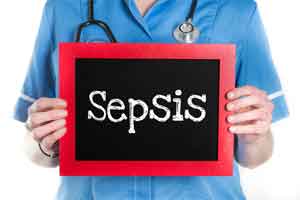- Home
- Editorial
- News
- Practice Guidelines
- Anesthesiology Guidelines
- Cancer Guidelines
- Cardiac Sciences Guidelines
- Critical Care Guidelines
- Dentistry Guidelines
- Dermatology Guidelines
- Diabetes and Endo Guidelines
- Diagnostics Guidelines
- ENT Guidelines
- Featured Practice Guidelines
- Gastroenterology Guidelines
- Geriatrics Guidelines
- Medicine Guidelines
- Nephrology Guidelines
- Neurosciences Guidelines
- Obs and Gynae Guidelines
- Ophthalmology Guidelines
- Orthopaedics Guidelines
- Paediatrics Guidelines
- Psychiatry Guidelines
- Pulmonology Guidelines
- Radiology Guidelines
- Surgery Guidelines
- Urology Guidelines
Potential treatment found for Sepsis and other infections

Their study reported in Science, demonstrates in both cells and animals that a small dose of topoisomerase I (Top 1) inhibitor can dampen an acute inflammatory reaction to infection while still allowing the body's protective defense to take place. The title of the study is "Topoisomerase 1 inhibition suppresses the transcriptional activation of innate immune responses and protects against inflammation-induced death."
The treatment may help control not only sepsis deadly infections often acquired in hospital by patients with a weak immune system but also new and brutal assaults on human immunity such as novel influenza strains and pandemics of Ebola and other singular infections, says the study's senior investigator, Ivan Marazzi, PhD, an Assistant Professor of Microbiology at the Icahn School of Medicine at Mount Sinai.
"Our results suggest that a therapy based on Top 1 inhibition could save millions of people affected by sepsis, pandemics, and many congenital deficiencies associated with acute inflammatory episodes what is known as a cytokine, or inflammatory, storm," says Marazzi.
"These storms occur because the body does not know how to adjust the appropriate level of inflammation that is good enough to suppress an infection but doesn't harm the body itself," he says. "This drug appears to offer that life-saving correction."
Sepsis is caused by an excessive host response to infection, which in turn leads to multiple organ failure and death. With an overall mortality rate between 20 and 50%, sepsis is the tenth leading cause of death in the U.S. it kills more people than do HIV and breast cancer.
"To date there has been no targeted treatment for sepsis, or for other infections that promote this inflammatory storm," says Dr. Marazzi. "Such treatment is desperately needed."
For example, sepsis is a leading cause of death in infants and children, he says. "Septic shock and lung destruction can occur when a child is suffering from a pneumonia caused by co-infection with a virus and a bacteria even when antibiotic therapy is being used. The elderly are also especially vulnerable to sepsis."
Following a challenge from the National Institutes of Health to repurpose existing drugs for new uses, the research team used a simple cellular screen to find candidate drugs that could tamp down rampant inflammation.
They discovered that the Top 1 inhibitor class of cancer drugs four have been previously approved for a variety of cancers also blocks a set of genes that are activated immediately by immune cells to combat an infection. "These genes are the ones that have the strongest inflammatory effects," says Marazzi.
The Mount Sinai team found that use of one to three doses of a Top 1 inhibitor that is 1/50th the strength of normal chemotherapy was enough to rescue 70-90 % of mice from an inflammatory storm death due to either acute bacterial infection, liver failure, or virus-bacteria co-infection. The treatment did not produce overt side effects.
They also tested the inhibitor in cells infected with influenza, Ebola, and other viral and bacterial microbes that over-stimulate the immune system, and found the drug blunted a dangerous immune reaction.
"We observed a striking effect of Top-1 inhibitors on expression of pro-inflammatory molecules induced by Ebola virus infection. This study contributes our understanding of pathogenesis of Ebola virus disease and also suggests a direction to develop treatments," says Alexander Bukreyev, PhD, Professor in the Department of Pathology and Microbiology & Immunology at the Galveston National Laboratory at the University of Texas Medical Branch.
"Finding remedies for these infection-induced inflammatory storms is a global focus, and we look forward to testing the ability of Top-1 inhibitors to save lives," adds Marazzi.
You can read the full article by clicking on the following link:
http://science.sciencemag.org/content/early/2016/04/27/science.aad7993

Disclaimer: This site is primarily intended for healthcare professionals. Any content/information on this website does not replace the advice of medical and/or health professionals and should not be construed as medical/diagnostic advice/endorsement or prescription. Use of this site is subject to our terms of use, privacy policy, advertisement policy. © 2020 Minerva Medical Treatment Pvt Ltd